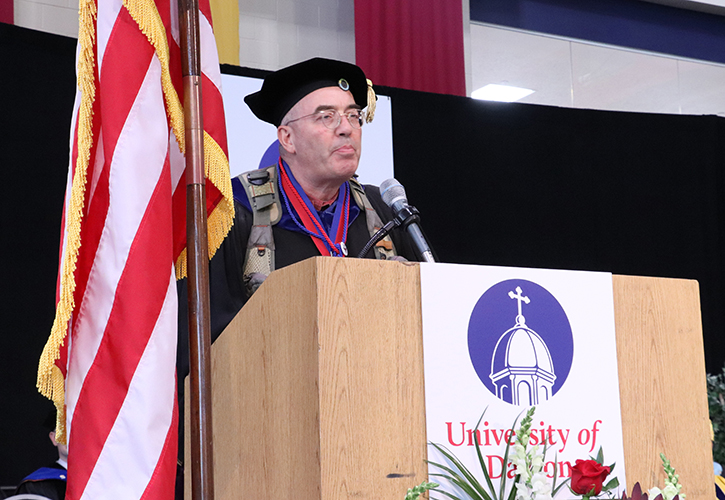College of Arts and Sciences Newsroom

Good Fishing and Good College
Roger J. Crum, professor of art history, was the faculty speaker Tuesday, Aug. 20, at the University of Dayton’s 2019 academic convocation, welcoming first-year students and new faculty. He has held the Graul Chair in Arts and Languages, directed numerous education abroad programs in Italy and received the College of Arts and Sciences’ Outstanding Teaching Award.
Here is the text of his address:
From my distant boyhood, I hear Jerry’s voice guiding me to fish without fishing. “Be at the river without a plan; be with no fixed idea for where to stand, how to cast, what fly to use. Sit on the bank; notice everything. Be there. Roger, you’ll catch fish.”
Good morning. Good fishing is like good college. I’ll get there. First, something familiar: “Where are you going to college, and what will be your major?” You said UD, and then chem, finance, or poly sci; the smartest among you said art history. Brilliant, but even that didn’t go very deep in conversation, and you were soon off the hook. I would have presented a different question, a different fly: “How are you going to be at college?” I don’t mean the “how” of arranging your room, finding your classes, or jumping into art history. I’m after bigger fish.
Being at college is knowing where you are. When fishing a river, you know you are not fishing a pond, lake, sea or ocean. Here at UD, you are not at a “vo-tech” school, a community college or even strictly a college. You’re at a university. What’s that? A good fly fisher never stops wondering about the river. Be at wondering about the university. But how?
For starters, being at university is gradually seeing the place as more compelling than what first rose to your attention. When fishing a river, you start with its main stream. Then you discover its vital tributaries, hidden springs, surprising eddies. At UD, your main stream will run from your dorm room to your classroom, your dorm room to the weight room, your dorm room to a tap room called Tim’s. You’ll establish routines; we all do. Give your routines a rest; don’t overfish your mainstream. Seek out tributaries beyond aquatic biology, explore springs away from engineering, find eddies other than guys named Eddy. Then, think like a smart fish. A fish that has but one hold in a habitat doesn’t last too long. Be smarter than a dead fish. Habituate yourself beyond the main stream.
Fly fishers talk about reading a river. Here, at UD, sit on the “banks” of campus and read how, why, and where it is, who, when and what it might be. Read why the Marianists first called this place Nazareth, the birth city of Mary. Read why Martin Luther King spoke here just days before receiving the Nobel Peace Prize. Read that it was here, here, that Elie Wiesel offered that we will never understand the Holocaust but we will always deepen the question. Hail Mary. Hail you. Mary pondered it all in her heart. Will you? Dr. King told us that we’ve come a long, long way, but we have a long, long way to go. Are we there? Are you? Deepen the question. How deep can you deepen all questions? To the moon and back, maybe to the “Omega Point?” What’s that, where’s that? Query that and more by meandering about this place. Go everywhere. Go where you have no classes, no immediate purpose. Go where you know nothing of what they do there with differential equations, nude models, fluid dynamics or things called torts that don’t taste like cake. Go around here ever composing your own yin and yang of being challenged and challenging, captivated and captivating, interested and interesting. And always the right, go-to answer to the question: “What are you reading? is “Let me tell you!”
Sounds daunting, but we are here to point the way. If you fish for trout, you talk with experts at the shop and learn from anyone else you find on or near the river. At UD, learn of course from your professors, but that’s easy. Harder is finding those whose classes you’ll never take. Find them, and then fish beyond them, too. Learn from the Marianists. Learn from those who clean, and fix, and tend this place. Learn from those who work here but who could never have afforded to be here. Learn from anyone who does not look, sound, act, think, dress, ambulate, recreate, meditate, pray or love like you. Be here now learning from many and be everywhere forever learning from all.
You can do this being here only if you know that your cell phone is a dummy clone. No one ever made a life friend or had a big thought on a cell phone. No one. I do take the phone with me to the river, but only because I might fall into a hole above my waders. I never have the plastic thing with me on campus. Here I want to be with you. Now President Spina is never without his plastic thing, but I get that: Every day, advancing UD into a future beyond plastics, Dr. Spina faces countless moments when falling into a hole is not entirely a metaphor. So, see Dr. Spina, reach into that hole, and give him your hand because you are here and you are glad to save your president. Four years from now, a grateful, drip-dry President Spina will extend his hand to you and give you your diploma. My colleagues and I will be there, too, happily present for you because being here with you being here will have made all the difference in why we are here together.
